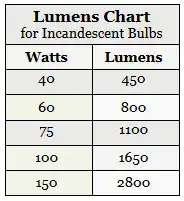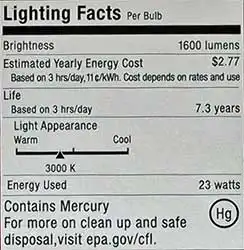Copyright 2024 Electrical101.com All Rights Reserved.



Light Bulb Packaging Info
Light Bulb Watts
Watts refers to the amount of power that is used to operate a light bulb (volts x amps). The wattage rating is usually labeled on a bulb and package. Light fixtures usually specify the maximum wattage allowed for a bulb. Never exceed the wattage rating of a light fixture.
Light Bulb Lumens
Lumens is a measure of light produced from a light source. When buying a light bulb, don’t look for wattage, look for lumens. See the “Lumens Chart for Incandescent Bulbs” below for light output compared to incandescent bulbs. CFLs and LEDs usually have a slightly lower lumens rating than an equivalent incandescent bulb, but will seem just as bright because of a higher color temperature.
A light bulb with the same lumens rating and a higher color temperature, will seem brighter because of the whiter color.
Lumens Per Watt
Lumens Per Watt (lm/W) refers to the efficiency of a bulb. The higher the number, the more efficient the bulb.
Light Bulb Outdoor Rating
Indoor or Outdoor Rating on a light bulb indicates whether it is rated for outdoors when used in a proper fixture. A bulb with an outdoor listing can withstand higher and lower temperatures during operation. Using a bulb not rated for outdoors in an outdoor fixture can void the bulb’s warranty and likely will not last as long as a bulb rated for outdoors.
Light Bulb Color Temperature
Light bulb color temperature is measured on the Kelvin scale (K). The higher the color temperature, the whiter the color. You may choose from a variety of color temperatures when buying fluorescent, LEDs, and automobile headlights. For more information, see the Color Temperature page.
Light Bulb Life
Bulb Life is measured in hours. Frequent on and off cycles can shorten the life of any bulb. Light bulbs will lose brightness over time.
Light Bulb Color Rendering Index (CRI)
Color Rendering Index (CRI) is a measure of the ability of a light source to reproduce the colors of various objects in comparison with an ideal or natural light source. The maximum CRI is 100, the higher the number, the better the color reproduction.

Common CFL packaging label
